
We all seen it, some clinicians are very enthusiastic about mechanical ventilation spending time to watch and analyze what is going on, while others who come do their routine round, check some nobs and go chart. Why is that ? and does it make a difference?
This is all speculative and not studied to my knowledge
A clinician who works with ventilators and genuinely loves the field might display several differences compared to those who don’t have the same passion for it:
Deep Engagement and Curiosity
Passionate Clinician: They are likely to be more deeply engaged in their work, continually seeking to understand the nuances of mechanical ventilation. They might stay updated on the latest advancements, research, and best practices in the field. This curiosity drives them to explore new technologies and methodologies with enthusiasm.
Less Passionate Clinician: They may still be competent but might approach the work as a routine task rather than an area of deep interest. They might not actively seek out new knowledge or innovations unless required.
Problem-Solving and Innovation
Passionate Clinician: They are more likely to take initiative in solving complex cases, perhaps coming up with innovative solutions or custom settings for patients with unique needs. Their love for the field might push them to think creatively and go the extra mile.
Less Passionate Clinician: While they may still solve problems effectively, they might rely more on established protocols and may be less inclined to explore unconventional approaches.
Patience and Persistence
Passionate Clinician: They might exhibit greater patience and persistence when dealing with challenging cases or troubleshooting ventilator issues. Their love for the work sustains them through difficult times, making them more resilient in the face of setbacks.
Less Passionate Clinician: They might prefer to stick to what they know works, potentially becoming frustrated more quickly if a situation doesn’t resolve easily.
Education and Mentorship
Passionate Clinician: They may be more inclined to educate others, sharing their enthusiasm and knowledge with colleagues, students, or trainees. They might take on a mentorship role, helping to cultivate the next generation of ventilator specialists.
Less Passionate Clinician: They might still teach but might not do so with the same level of enthusiasm or depth, possibly focusing more on the basics rather than inspiring others with the broader possibilities within the field.
Emotional Connection
Passionate Clinician: Their love for ventilators might translate into a strong emotional connection with their work, leading to a greater sense of fulfillment and satisfaction. This could also make them more attuned to the emotional aspects of patient care, as they see their work as a vital, life-sustaining effort.
Less Passionate Clinician: They might approach the work more clinically and objectively, focusing on the technical aspects without as much emotional investment. This can still be effective but might lack the same depth of personal satisfaction.
Overall, the key difference lies in the level of enthusiasm and commitment to the specific field of ventilators. A clinician who loves working with ventilators is likely to be more proactive, innovative, and emotionally invested in their work, which can positively impact both patient outcomes and their personal job satisfaction.
So, lets get the enthusiasm and energy again, but how ?
There is no pill for that unfortunately

